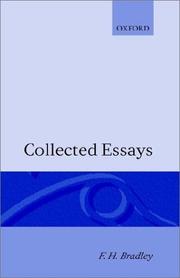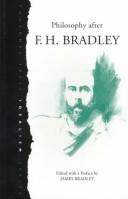| Listing 1 - 10 of 10 |
Sort by
|
Book
Year: 1942 Publisher: Ithaca, New York, : Cornell University Press,
Abstract | Keywords | Export | Availability | Bookmark
 Loading...
Loading...Choose an application
- Reference Manager
- EndNote
- RefWorks (Direct export to RefWorks)
Book
Year: 1934 Publisher: Lund, : A.-b. Gleerupska univ.-bokhandeln,
Abstract | Keywords | Export | Availability | Bookmark
 Loading...
Loading...Choose an application
- Reference Manager
- EndNote
- RefWorks (Direct export to RefWorks)
Reality. --- Values. --- Bradley, F. H.

ISBN: 9780198243410 0198243413 Year: 2002 Publisher: Oxford : Clarendon Press,
Abstract | Keywords | Export | Availability | Bookmark
 Loading...
Loading...Choose an application
- Reference Manager
- EndNote
- RefWorks (Direct export to RefWorks)
Book
ISBN: 9781108040181 Year: 2011 Publisher: Cambridge : Cambridge university press,
Abstract | Keywords | Export | Availability | Bookmark
 Loading...
Loading...Choose an application
- Reference Manager
- EndNote
- RefWorks (Direct export to RefWorks)
Judgment (Logic). --- Logic. --- Bradley, F. H.
Book
Year: 1964 Publisher: London : Faber and Faber,
Abstract | Keywords | Export | Availability | Bookmark
 Loading...
Loading...Choose an application
- Reference Manager
- EndNote
- RefWorks (Direct export to RefWorks)
Knowledge, Theory of. --- Bradley, F. H., --- Leibniz, Gottfried Wilhelm,

ISBN: 1855064855 1855064847 9781855064850 9781855064843 Year: 1996 Publisher: Bristol : Thoemmes,
Abstract | Keywords | Export | Availability | Bookmark
 Loading...
Loading...Choose an application
- Reference Manager
- EndNote
- RefWorks (Direct export to RefWorks)
In the fields of metaphysics and epistemology, ethics and political thought, idealism can generate controversy and disagreement. This title is part of the "Idealism" series, which finds in idealism new features of interest and a perspective which is germane to our own philosophical concerns. This text is a collection of essays analyzing the impact of the thought of F.H. Bradley (1846-1924) on philosophy throughout the English-speaking world. Bradley's complex version of absolute idealism plays a key role not only in idealist philosophy, politics and ethics, but also in the development of modern logic, of analytical philosophy, and of pragmatism, as well as in the thinking of figures such as R.G. Collingwood and A.N. Whitehead. The work of a group of Canadian philosophers writing from widely different standpoints, the essays in this volume define both the nature and scale of Bradley's influence and continuing significance in large areas of debate in 20th-century philosophy. Topics covered include: the history of idealism in the 20th century; Bradley's relation to figures such as Bernard Bosanquet, C.A. Campbell, Brand Blanshard, John Watson, John Dewey, R.G. Collingwood, and A.N. Whitehead; Bradley's influence on 20th-century empiricism, modern logic, and analytical philosophy; and his significance for contemporary debates in epistemology and ethics.
Idealism --- Empiricism. --- Idéalisme --- Empirisme --- History --- Histoire --- Bradley, F. H. --- Influence. --- Idéalisme --- Idealism. --- Idéalisme.
Book
ISBN: 1139136453 1108040187 Year: 1885 Publisher: Place of publication not identified : Cambridge : publisher not identified, Cambridge University Press
Abstract | Keywords | Export | Availability | Bookmark
 Loading...
Loading...Choose an application
- Reference Manager
- EndNote
- RefWorks (Direct export to RefWorks)
After more than a decade teaching ancient Greek history and philosophy at University College, Oxford, British philosopher and political theorist Bernard Bosanquet (1848-1923) resigned from his post to spend more time writing. He was particularly interested in contemporary social theory, and was involved with the Charity Organisation Society and the London Ethical Society. He wrote numerous articles before beginning this book, which was his first and was published in 1885 as a response to the Principles of Logic, published in 1883, by his contemporary F. H. Bradley (1846-1924). Bosanquet, who was deeply influenced by the German philosopher Hegel (1770-1831), argues that there are 'signs of a philosophical movement in this country which may assimilate what is really great in European philosophy, without forfeiting the distinctive merits of English thought'. With this as the framework, the book examines the relationship of judgment and logic to knowledge.
Bradley, F. H. (Francis Herbert), 1846-1924 --- Logic --- Judgment (Logic) --- Philosophy
Book
ISBN: 9782848321530 2848321539 2848324317 Year: 2020 Publisher: Arras : Artois Presses Université,
Abstract | Keywords | Export | Availability | Bookmark
 Loading...
Loading...Choose an application
- Reference Manager
- EndNote
- RefWorks (Direct export to RefWorks)
Il est fréquent de lire que la philosophie de K H. Bradley a été négligée, et que cette situation relève du paradoxe dans la mesure où il était considéré comme un auteur philosophique majeur de son vivant. De façon similaire, l’idéalisme, qui a dominé la sphère philosophique britannique pendant le dernier tiers du XIXe siècle, est souvent présenté comme un phénomène étrange dans un pays où l’empirisme, comme l’opinion commune s’accorde à le dire, constitue la tradition philosophique majeure. L’explication couramment retenue est que l’idéalisme et l’œuvre de Bradley n’ont été que des transitions, préparant l’éclosion de la philosophie de Bertrand Russell et de l’empirisme logique au début du XXe siècle. Cette explication est insuffisante. Elle ignore l’importance du retour à la spéculation métaphysique de la philosophie anglaise pendant tout le XIXe siècle et elle masque les circonstances qui l’ont accompagné. Une réévaluation a été menée en Angleterre depuis les années 1980, et la publication récente des inédits de Bradley et de sa correspondance apporte des indications fort utiles sur l’essor de l’idéalisme au moment où Bradley a entrepris ses études de philosophie. La forme caractéristique de l’idéalisme britannique pendant la période victorienne tardive, le néo-hégélianisme, est le fruit d’un bouleversement philosophique initié au début du siècle par les romantiques sur fond d’essoufflement des philosophies britanniques de l’époque. H est aussi au programme d’un cénacle idéaliste officieux constitué à Oxford à la fin des années 1860 autour de T. H. Green, dont Bradley a été le fer de lance. En outre, ce mouvement idéaliste n’a pas suivi à la lettre le système hégélien : il a également puisé dans un fonds platonicien autochtone qui en a été en quelque sorte le substrat vital. C’est ce que confirme l’évolution même de la philosophie de Bradley pendant ses années de formation.
Idealism, English. --- Idéalisme anglais --- Bradley, F. H. --- Philosophy --- critique --- interprétation --- idéalisme anglais --- mouvement idéaliste --- période victorienne --- œuvre philosophique
Book
ISBN: 1139136534 1108040276 Year: 2012 Publisher: Cambridge : Cambridge University Press,
Abstract | Keywords | Export | Availability | Bookmark
 Loading...
Loading...Choose an application
- Reference Manager
- EndNote
- RefWorks (Direct export to RefWorks)
F. H. Bradley (1846-1924) was the foremost philosopher of the British Idealist school, which came to prominence in the second half of the nineteenth century and remained influential into the first half of the twentieth. Bradley, who was influenced by Hegel and also reacted against utilitarianism, was recognised during his lifetime as one of the greatest intellectuals of his generation, and was the first philosopher to receive the Order of Merit, in 1924. In this major work, originally published in 1883, Bradley discusses the basic principles of logic: judgment and inference. He rejects the idea of a separation between mind and body, arguing that human thought cannot be separated from its worldly context. In the second edition, published in 1922 and reissued here, Bradley added a commentary and essays, but left the text largely unaltered. Volume 1 contains Book 1 on judgment and Book 2 on inference.
Logic, Modern --- Bradley, F. H. --- Philosopher --- Bradley, Francis Herbert, --- Po-lieh-te-lai, --- Pu-la-te-lei,

ISBN: 9780511498008 9780521834056 9780521174213 0511080409 9780511080401 0511498004 9780511079641 0511079648 1280421886 9781280421884 0521834058 1107139457 9781107139459 0511170556 9780511170553 0511206437 9780511206436 0511297653 9780511297656 052117421X Year: 2005 Publisher: Cambridge, U.K. New York Cambridge University Press
Abstract | Keywords | Export | Availability | Bookmark
 Loading...
Loading...Choose an application
- Reference Manager
- EndNote
- RefWorks (Direct export to RefWorks)
Originally published in 2005, this book is a major contribution to the study of the philosopher F. H. Bradley, the most influential member of the nineteenth-century school of British Idealists. It offers a sustained interpretation of Bradley's Principles of Logic, explaining the problem of how it is possible for inferences to be both valid and yet have conclusions that contain new information. The author then describes how this solution provides a basis for Bradley's metaphysical view that reality is one interconnected experience and how this gives rise to a new problem of truth.
Logic. --- Metaphysics. --- Philosophy --- God --- Ontology --- Philosophy of mind --- Argumentation --- Deduction (Logic) --- Deductive logic --- Dialectic (Logic) --- Logic, Deductive --- Intellect --- Psychology --- Science --- Reasoning --- Thought and thinking --- Methodology --- Bradley, F. H. --- Bradley, Francis Herbert, --- Po-lieh-te-lai, --- Pu-la-te-lei, --- Arts and Humanities
| Listing 1 - 10 of 10 |
Sort by
|

 Search
Search Feedback
Feedback About UniCat
About UniCat  Help
Help News
News